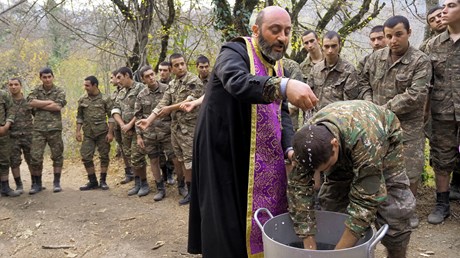Armenian and Azerbaijani Christians find comfort in the Scriptures and fervent prayer as the war in the Caucasus takes a dramatic turn.

Editor’s note: CT’s complete coverage of Armenian Christians is here.
The Armenian mountain stronghold of Shushi is under attack.
The second city of Nagorno-Karabakh, one of its oldest artifacts is a 15th-century Bible. Earlier in the conflict this year, its 19th-century cathedral was struck twice and damaged by missiles.
But Azerbaijanis—who call it Shusha—celebrate it also as a cultural heritage. Many of their famous poets and musicians hail from the once-mixed city.
As the six-week war progressed, Azerbaijan steadily retook the plains below. But facing the coming winter, its military faced a stark choice: impose a siege, or scale the mountain.
Without Shusha, President Ilham Aliyev said, the job is only half done.
Despite its Armenian-majority population, Nagorno-Karabakh was assigned to Azerbaijan in the 1920s by Joseph Stalin. Both nations became independent in 1991, and the mountainous enclave conducted a referendum to declare itself the Republic of Artsakh. Ethnic warfare gripped the region, with 30,000 killed and around 1 million displaced.
Population transfers largely emptied each nation of its opposite ethnicity.
At the time of the ceasefire in 1994, Armenians controlled roughly 20 percent of Azerbaijan. No nation recognized Artsakh, and internationally sponsored negotiations began—and eventually stalled.
But buoyed by a financial windfall from oil and gas exports to Europe, as well as advanced weapons from Israel and Turkey, in late September Azerbaijan pressed its military advantage. If successful, it will perch above Stepanakert, the capital city of Nagorno-Karabakh, only six miles away.
“After 28 years, the adhan [call to prayer] will be heard in Shusha,” celebrated Aliyev. “Our ...
from Christianity Today Magazine
via

.gif)

.gif)

.gif)
.gif)
